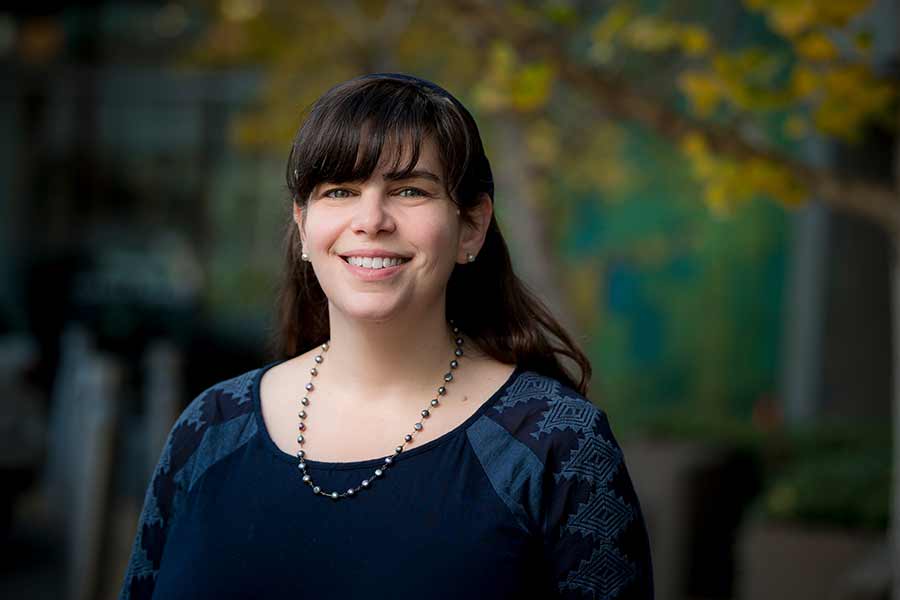By:
- Erika Johnson
Published Date
By:
- Erika Johnson
Share This:
Granting the Gift of Hope
UC San Diego Health Chaplain Allison Kestenbaum receives grant to pilot spiritual care program

Allison Kestenbaum, a chaplain with UC San Diego Health, will lead a new hands-on program for students to learn how to care for the spiritual needs of those who are gravely ill. Photo by Erik Jepsen/UC San Diego Publications
When a person is afflicted by a serious illness, certain existential questions often arise—from how medical treatments will affect the quality of life to what happens after death.
For those seeking emotional and spiritual counsel during times of sickness, Allison Kestenbaum is there to connect, comfort and counsel patients. As a chaplain with UC San Diego Health, she works collaboratively with a palliative care team made up of physicians, nurses, psychiatrists and social workers to support patients and their loved ones as they navigate challenging health conditions.
Kestenbaum was recently named a Sojourns Scholar by Cambia Health Foundation, and received a two-year $180,000 grant to conduct an innovative project in the field of palliative care. She is one of 12 emerging health care professionals to be chosen for the leadership program—and the first chaplain ever to be selected. Kestenbaum was also invited to join a learning community, and was matched with pioneers in the field of palliative care to gain key advice and mentorship.
This spring, the new hands-on program will launch at UC San Diego Health, offering seminary students, local clergy leaders and those in the health care field an opportunity to learn how to care for the spiritual needs of those who are gravely ill. The Palliative Care Specialty Spiritual Care Education program at UC San Diego Health will be unique in the way it focuses entirely on spiritual care.
“I am incredibly grateful to the Cambia Foundation, the staff and the selection committee for their support,” said Kestenbaum. “What I am most excited about is building relationships between medical providers and religious leaders. Working together, we can really help patients navigate difficult moral decisions and find relief from suffering.”
This May, the first students will enroll in the spiritual care education program, where they will have the chance to interact with patients at all of the UC San Diego Health hospital and clinic locations. The six-month program will teach students how to listen compassionately to a patient’s needs and how to start crucial conversations about medical treatment options. In addition, instruction will include the ways in which prayer, meditation and other spiritual guidance can comfort patients and family members, as well as health care staff.
“My goal is to inspire confidence in student’s ability to provide spiritual care by prompting them to discover what aspect of illness they most fear, and finding ways of coping using their own spiritual tradition,” explained Kestenbaum, who works primarily with cancer patients at Moores Cancer Center. “They can then successfully counsel their own congregants who are going through the same worries and struggles.”
For Kestenbaum, it all starts with a relationship. She spends time with each patient, offering a sense of affirmation. She believes that everyone is spiritual—all have important people in their lives, pursue passions that have meaning to them and experience belonging in community. Others are religious, and believe in a higher power. After understanding a patient’s spiritual foundation, Kestenbaum works with the palliative care team to determine the best path to wellbeing.
And she sees patients find peace. “It is rewarding to see patients and their families find some relief from suffering,” she said. “I am inspired by our holistic team that treats the whole person, not just their illness. It renews my faith and optimism every day.”
Palliative care is commonly misunderstood. This holistic support can happen at any point in a patient’s journey, from the first meeting with their doctor to the last weeks or days of their life. This includes but is not limited to hospice care, a kind of palliative care that happens when a patient is no longer receiving treatment. Kestenbaum is referred to patients by doctors, and attends every consultation. She learns about their challenges—from pain to insomnia to anxiety—and creates a healing program that is consistent with patient’s belief systems and cultural traditions. Kestenbaum also helps patients make serious decisions about medical treatments and explore ways to maintain a high quality of life.
“All too often, the spiritual aspects of serious illness go unrecognized and unaddressed, causing patients to suffer needlessly with concerns about hope, relationships, their faith, meaning and dignity,” said Dr. William Mitchell, medical oncologist and director of the Doris Howell Service for Palliative Medicine at UC San Diego. “We were very fortunate to be able to recruit Allison, an expert in the spiritual care of patients with serious illness. This funding for the Palliative Care Specialty Spiritual Care Education program will allow UC San Diego to more completely care for the whole person when they come to us for help.”
Support from Cambia Health Foundation contributes toward the campus’ $2 billion fundraising goal as part of the Campaign for UC San Diego. The Campaign is focused on enhancing the student experience, enriching our campus community and sparking research and innovation.
UC San Diego Health’s team of experts who specialize in palliative care is one of the busiest and most well-staffed in the country. They offer comprehensive and compassionate care to those who are hospitalized with a serious illness. They also offer outpatient appointments to those with cancer. Learn more about UC San Diego Health Palliative Care.
Share This:
You May Also Like
Stay in the Know
Keep up with all the latest from UC San Diego. Subscribe to the newsletter today.



